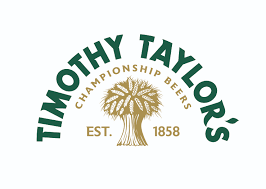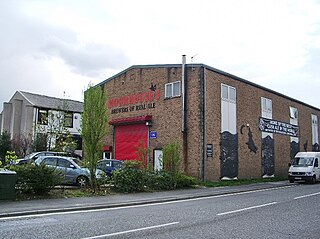Adnams is a regional brewery founded in 1872 in Southwold, Suffolk, England, by George and Ernest Adnams. It produces cask ale and bottled beers. Annual production is around 85,000 barrels.
The Molson Brewery is a Canadian-based brewery based in Montreal and was established in 1786 by the Molson family. In 2005, Molson merged with the Adolph Coors Company to become Molson Coors.

Kimberley is a market town and civil parish in the Borough of Broxtowe in Nottinghamshire, England, lying 6 miles northwest of Nottingham along the A610. The town grew as a centre for coal mining, brewing and hosiery manufacturing. At the 2011 census the town had a population of 6,053, and this fell to 6,033 at the 2021 census.

The Anchor Brewery was a brewery in Park Street, Southwark, London, England. Established in 1616, by the early nineteenth century it was the largest brewery in the world. From 1781 it was operated by Barclay Perkins & Co, who in 1955 merged with the Courage Brewery, which already owned the nearby Anchor Brewhouse. The Park Street brewery was demolished in 1981.

Greene King is a British pub and brewing company founded in 1799, currently based in Bury St Edmunds, Suffolk. The company also owns brands including Hungry Horse and Farmhouse Inns, as well as other pubs, restaurants and hotels. It was listed on the London Stock Exchange (LSE), until it was acquired by CK Assets in October 2019.
Webster's Brewery was a brewery founded in 1838 by Samuel Webster which operated at the Fountain Head Brewery in Halifax, West Yorkshire, England. Webster's Green Label, a light mild, and Yorkshire Bitter gained national distribution after the company was taken over by Watney Mann in 1972. Throughout the 1970s it was known for the advertising slogan: "Drives out the northern thirst".

Burtonwood is a village in the civil parish of Burtonwood and Westbrook, in the Borough of Warrington, Cheshire, England. Within the boundaries of the historic county of Lancashire, the name Burtonwood is known worldwide as the location of the former RAF Station Burtonwood military camp. Burtonwood village itself is a few miles away from the site of the former station. The civil parish also includes Westbrook, which is a council ward and suburb of Warrington. According to the 2001 census, the population of the entire civil parish was 11,265.

Beer has been brewed in England for thousands of years. As a beer brewing country, it is known for top fermented cask beer which finishes maturing in the cellar of the pub rather than at the brewery and is served with only natural carbonation.

Morland was a brewery in Abingdon-on-Thames, Oxfordshire, England, and the second oldest brewer in England, until it was bought by Greene King in 2000. Morland's beers include Hen's Tooth, Old Speckled Hen, Tanner's Jack and Morland's Original.

Timothy Taylor's is a family-owned regional brewery, founded in 1858 by Timothy Taylor, in Keighley, West Yorkshire, England. Timothy Taylor's moved to larger premises in 1863 at Knowle Spring in Keighley, where they remain.

Belhaven Brewery is a brewery based in Belhaven, Scotland. The brewery dates from 1719, at least; by 2005 it had become the largest and oldest surviving independent brewery in Scotland. In November 2005, the Suffolk based brewery Greene King completed a £187 million takeover of the company. The brewery complex is designated Category A listed.
Maxim Brewery is a beer brewing company based in Houghton-le-Spring, United Kingdom. It was set up to rescue the famous Double Maxim beer, which had ceased production when the Vaux brewery was closed in 1999. In 2019 Maxim Brewery supported the making of a short film 'A passion for Vaux' celebrating Sunderland large but not forgotten brewery. In 2021, the new beers, Maverick and Medusa, were launched.

Moorhouse's is an independent brewery founded in 1865, by William Moorhouse in Burnley Lancashire, England, as a producer of mineral waters and low-alcohol beers known as hop bitters. It first produced cask ales in 1978.

Robinsons Brewery is a family-run, regional brewery, founded in 1849 at the Unicorn Inn, Stockport, Cheshire, England.

Beer in the United Kingdom has a long history, and has quite distinct traditions. Historically the main styles were top-fermented Bitters, Porters, Stouts and Milds, but after World War II lagers took over half the market by volume. The Campaign for Real Ale (CAMRA) was founded in 1971 and has encouraged the preservation and revival of traditional styles of ale. In particular CAMRA has promoted cask conditioned beer, which completes its maturation in casks in the cellar of the pub rather than at the brewery. As of 2014 the UK drank 634 million imperial pints of cask ale, representing 60% of ale in pubs and restaurants and 17% of all beer in pubs. In total 42.42 million hectolitres of beer were produced in 2013 of which 48% was sold in the off-trade.
The Cobbold family became influential in Ipswich and Suffolk in the eighteenth and nineteenth centuries. The family is best known for brewing, moving its operations from Harwich to Ipswich in 1746, and as the driving force behind Ipswich Town Football Club, both as an amateur and professional team. During its Victorian heyday, the family also had interests in coal, shipping, the railways and banking.
Blue Monkey Brewery is a 20 barrel microbrewery located on the border of Nottinghamshire and Derbyshire. Founded in Ilkeston in 2008, the company doubled its capacity and moved to Giltbrook in 2010. It produces beers, including Ape Ale and Guerrilla Porter. It currently has four outlets; The Organ Grinder Nottingham, The Organ Grinder Loughborough, The Organ Grinder Newark and The Coffee Grinder Arnold

Wharfedale Brewery is a brewery situated in Ilkley in Wharfedale, West Yorkshire, England, on the edge of the Yorkshire Dales National Park. Two, now defunct, breweries in Yorkshire have previously used the Wharfedale name; first in Wetherby in the 1756 and again in Grassington in 2003. The name was resurrected for a third time, further down the River Wharfe, in 2012 by a group of 16 real ale enthusiasts, many of whom are former chairmen of Ilkley & District Round Table.
The city of Rochester, New York—before being known as the birthplace of Kodak, Xerox, and Bausch & Lomb—was internationally known for its robust brewing industry. Indeed, the city was uniquely positioned for such an industry in the early 19th century. The corn, rye, barley, wheat, and other grains grown in the Genesee River Valley were shipped down river to be milled in such quantity that by 1838 Rochester was world's largest flour producer, earning it the nickname the Flour City.














